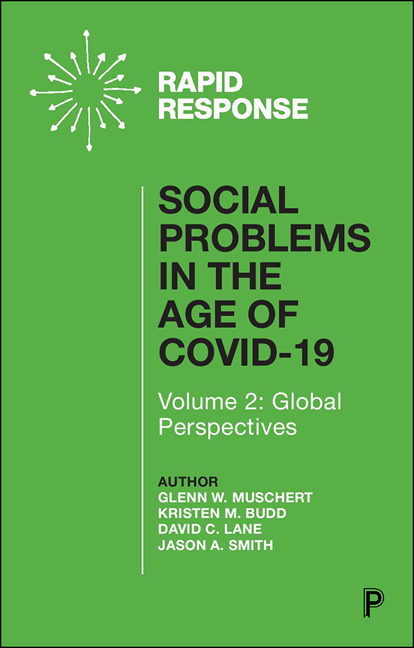Book contents
- Frontmatter
- Contents
- Acknowledgments
- Presidential Welcome
- Editorial Introduction
- 1 Isolation, Economic Desperation, and Exploitation: Human Trafficking and the COVID-19 Crisis
- 2 Uncertainty and Disruption in the Transition to Adulthood During COVID-19
- 3 Disability Rights and Healthcare Rationing during COVID-19
- 4 Social-Distancing the Settler-State: Indigenous Peoples in the Age of COVID-19
- 5 The Pandemic and the Invisible Poor of the Global South: Slum Dwellers in Mumbai, India and Dhaka, Bangladesh
- 6 The Human Right to Water and Sanitation in the Age of COVID-19
- 7 Pandemic Perils of Migrant Workers: Inequalities Intensified
- 8 Food Insecurity and COVID-19
- 9 Protecting Refugee Health and Human Rights in the Context of the COVID-19 Pandemic: Challenges and Pathways to Justice
- 10 COVID-19 Requires an Intersectional Feminist Policy Response
- End Matter
- Afterword
- Index
Afterword
Published online by Cambridge University Press: 23 March 2021
- Frontmatter
- Contents
- Acknowledgments
- Presidential Welcome
- Editorial Introduction
- 1 Isolation, Economic Desperation, and Exploitation: Human Trafficking and the COVID-19 Crisis
- 2 Uncertainty and Disruption in the Transition to Adulthood During COVID-19
- 3 Disability Rights and Healthcare Rationing during COVID-19
- 4 Social-Distancing the Settler-State: Indigenous Peoples in the Age of COVID-19
- 5 The Pandemic and the Invisible Poor of the Global South: Slum Dwellers in Mumbai, India and Dhaka, Bangladesh
- 6 The Human Right to Water and Sanitation in the Age of COVID-19
- 7 Pandemic Perils of Migrant Workers: Inequalities Intensified
- 8 Food Insecurity and COVID-19
- 9 Protecting Refugee Health and Human Rights in the Context of the COVID-19 Pandemic: Challenges and Pathways to Justice
- 10 COVID-19 Requires an Intersectional Feminist Policy Response
- End Matter
- Afterword
- Index
Summary
It is hard to envision a social problem that has impacted the world so quickly, widely, and severely as the COVID-19 pandemic. It is truly a global singularity that has affected us all in some way. The volume before this one, Social Problems in the Age of COVID-19: Volume 1, focused on the context of the United States, while this volume expands the focus to the rest of the world. This division of conceptual labor is practical, but of course a pandemic is a social problem without borders, and its presence in any part of the world bears implications for the rest. To one degree or another, whether directly or indirectly, we have all suffered from COVID-19, but not to the same extent and with the same degree of consequence. Indeed, as many of the chapters in these two volumes indicate, the pandemic has deepened and entrenched existing inequalities. Some of us have suffered (and recovered) from the illness. Some of us have lost loved ones, close friends, and colleagues. Others have lost their job or face new challenges in a workplace that has suddenly become a zone of heightened risk of contagion, including those working at supermarkets, first responders, and those delivering essential goods and services across borders otherwise closed to the public at large, among others. An enormous number of people have had their work–life routines overturned, with children suddenly joining parents in quarantine at home, schools and daycares—where available—shut down or services greatly reduced, and many shifting to online connectivity for their work where possible. Even for those who are relatively less directly affected, the mental health impacts that are emerging in the wake of this pandemic are not easy to dismiss. I’m thinking here of social interactions and processes we often take for granted, but which look suddenly quite different, like dating, going with friends to see a movie, or being able to be physically close to those we are in a relationship with but may be currently separated from.
Yet with this said, taking a sociological, wide-angle view, it is clear that there are preexisting structural inequalities that differently pattern our risk and susceptibility to COVID-19.
- Type
- Chapter
- Information
- Social Problems in the Age of COVID-19 Vol 2Volume 2: Global Perspectives, pp. 133 - 142Publisher: Bristol University PressPrint publication year: 2020



